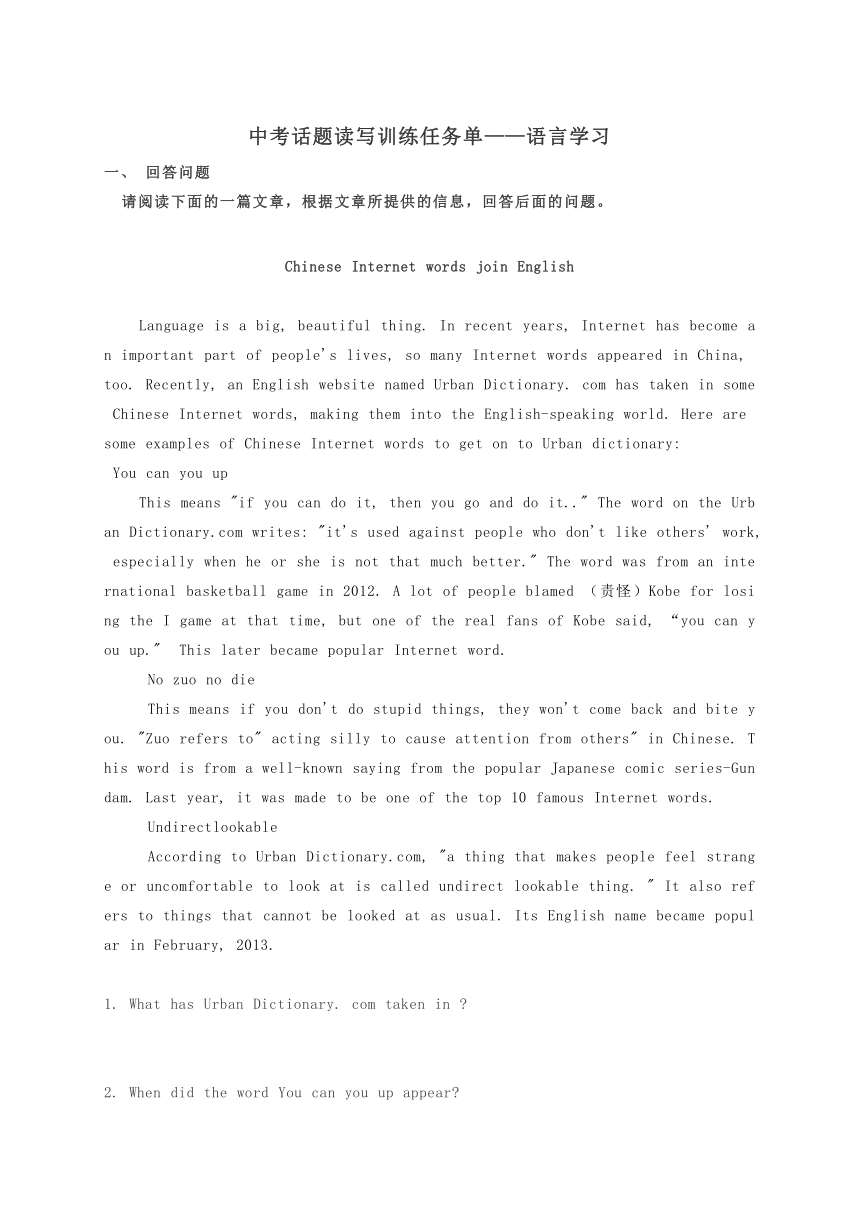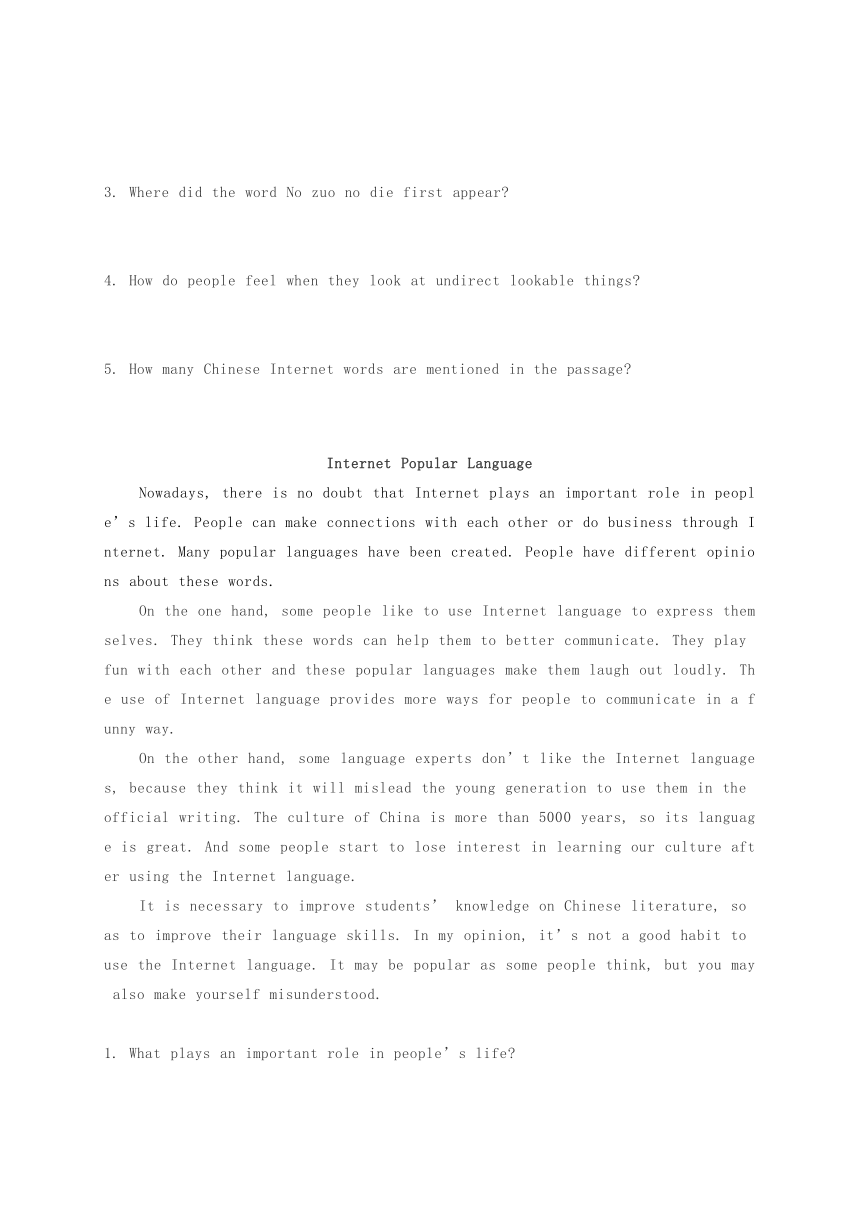中考话题读写训练任务单——语言学习(无答案)
文档属性
| 名称 | 中考话题读写训练任务单——语言学习(无答案) |

|
|
| 格式 | zip | ||
| 文件大小 | 59.3KB | ||
| 资源类型 | 教案 | ||
| 版本资源 | 通用版 | ||
| 科目 | 英语 | ||
| 更新时间 | 2020-03-28 23:02:09 | ||
图片预览


文档简介
中考话题读写训练任务单——语言学习
一、 回答问题
请阅读下面的一篇文章,根据文章所提供的信息,回答后面的问题。
Chinese Internet words join English
Language is a big, beautiful thing. In recent years, Internet has become an important part of people's lives, so many Internet words appeared in China, too. Recently, an English website named Urban Dictionary. com has taken in some Chinese Internet words, making them into the English-speaking world. Here are some examples of Chinese Internet words to get on to Urban dictionary:
You can you up
This means "if you can do it, then you go and do it.." The word on the Urban Dictionary.com writes: "it's used against people who don't like others' work, especially when he or she is not that much better." The word was from an international basketball game in 2012. A lot of people blamed (责怪)Kobe for losing the I game at that time, but one of the real fans of Kobe said, “you can you up." This later became popular Internet word.
No zuo no die
This means if you don't do stupid things, they won't come back and bite you. "Zuo refers to" acting silly to cause attention from others" in Chinese. This word is from a well-known saying from the popular Japanese comic series-Gundam. Last year, it was made to be one of the top 10 famous Internet words.
Undirectlookable
According to Urban Dictionary.com, "a thing that makes people feel strange or uncomfortable to look at is called undirect lookable thing. " It also refers to things that cannot be looked at as usual. Its English name became popular in February, 2013.
1. What has Urban Dictionary. com taken in ?
2. When did the word You can you up appear?
3. Where did the word No zuo no die first appear?
4. How do people feel when they look at undirect lookable things?
5. How many Chinese Internet words are mentioned in the passage?
Internet Popular Language
Nowadays, there is no doubt that Internet plays an important role in people’s life. People can make connections with each other or do business through Internet. Many popular languages have been created. People have different opinions about these words.
On the one hand, some people like to use Internet language to express themselves. They think these words can help them to better communicate. They play fun with each other and these popular languages make them laugh out loudly. The use of Internet language provides more ways for people to communicate in a funny way.
On the other hand, some language experts don’t like the Internet languages, because they think it will mislead the young generation to use them in the official writing. The culture of China is more than 5000 years, so its language is great. And some people start to lose interest in learning our culture after using the Internet language.
It is necessary to improve students’ knowledge on Chinese literature, so as to improve their language skills. In my opinion, it’s not a good habit to use the Internet language. It may be popular as some people think, but you may also make yourself misunderstood.
1. What plays an important role in people’s life?
2. Why do some people like to use Internet language to express themselves?
3. How long is the culture of China ?
4. What happen to some people after using the Internet language?
5. What does the writer think of the Internet language?
二、 书面表达
假如你叫周萍,你的英国笔友Jane来信询问汉语中一些流行的网络语言的意思,请给她回封电子邮件。
内容包括:
1. 解释汉语中一些流行的网络语言。如“点赞”、“任性”、“秒杀”、“土豪”等;
2. 谈谈你对网络语言的看法;
3. 询问英语中是否有流行的网络语言及对方的看法。
作文要求:
1. 不能照抄原文;不得在作文中出现学校真实的名称和学生的真实姓名。
2. 语句连贯,词数80个左右。作文的开头和结尾已经给出,不计入总词数。
审题:
确定基调:
题材:______________
人称:______________
时态:______________
写作思路
1. 解释网络流行语的中文含义;
2. 谈谈你对网络语言的看法;
3. 提一个问题,询问对方的情况及看法。
Let’s brainstorm!(从4个方面列出与本文内容相关的单词、短语、句子、文段)
单词:____________________________________
短语:____________________________________
句子:
文段
汇总成完整文章:
Dear Jane,
In your letter, you asked me about the meanings of some Internet words in Chinese. Here are some of them.
Yours,
Zhou Ping
2. 请同学们再找一些自己感兴趣的网络语言,仿照本文章思路,再写一篇关于网络语言的文章。
一、 回答问题
请阅读下面的一篇文章,根据文章所提供的信息,回答后面的问题。
Chinese Internet words join English
Language is a big, beautiful thing. In recent years, Internet has become an important part of people's lives, so many Internet words appeared in China, too. Recently, an English website named Urban Dictionary. com has taken in some Chinese Internet words, making them into the English-speaking world. Here are some examples of Chinese Internet words to get on to Urban dictionary:
You can you up
This means "if you can do it, then you go and do it.." The word on the Urban Dictionary.com writes: "it's used against people who don't like others' work, especially when he or she is not that much better." The word was from an international basketball game in 2012. A lot of people blamed (责怪)Kobe for losing the I game at that time, but one of the real fans of Kobe said, “you can you up." This later became popular Internet word.
No zuo no die
This means if you don't do stupid things, they won't come back and bite you. "Zuo refers to" acting silly to cause attention from others" in Chinese. This word is from a well-known saying from the popular Japanese comic series-Gundam. Last year, it was made to be one of the top 10 famous Internet words.
Undirectlookable
According to Urban Dictionary.com, "a thing that makes people feel strange or uncomfortable to look at is called undirect lookable thing. " It also refers to things that cannot be looked at as usual. Its English name became popular in February, 2013.
1. What has Urban Dictionary. com taken in ?
2. When did the word You can you up appear?
3. Where did the word No zuo no die first appear?
4. How do people feel when they look at undirect lookable things?
5. How many Chinese Internet words are mentioned in the passage?
Internet Popular Language
Nowadays, there is no doubt that Internet plays an important role in people’s life. People can make connections with each other or do business through Internet. Many popular languages have been created. People have different opinions about these words.
On the one hand, some people like to use Internet language to express themselves. They think these words can help them to better communicate. They play fun with each other and these popular languages make them laugh out loudly. The use of Internet language provides more ways for people to communicate in a funny way.
On the other hand, some language experts don’t like the Internet languages, because they think it will mislead the young generation to use them in the official writing. The culture of China is more than 5000 years, so its language is great. And some people start to lose interest in learning our culture after using the Internet language.
It is necessary to improve students’ knowledge on Chinese literature, so as to improve their language skills. In my opinion, it’s not a good habit to use the Internet language. It may be popular as some people think, but you may also make yourself misunderstood.
1. What plays an important role in people’s life?
2. Why do some people like to use Internet language to express themselves?
3. How long is the culture of China ?
4. What happen to some people after using the Internet language?
5. What does the writer think of the Internet language?
二、 书面表达
假如你叫周萍,你的英国笔友Jane来信询问汉语中一些流行的网络语言的意思,请给她回封电子邮件。
内容包括:
1. 解释汉语中一些流行的网络语言。如“点赞”、“任性”、“秒杀”、“土豪”等;
2. 谈谈你对网络语言的看法;
3. 询问英语中是否有流行的网络语言及对方的看法。
作文要求:
1. 不能照抄原文;不得在作文中出现学校真实的名称和学生的真实姓名。
2. 语句连贯,词数80个左右。作文的开头和结尾已经给出,不计入总词数。
审题:
确定基调:
题材:______________
人称:______________
时态:______________
写作思路
1. 解释网络流行语的中文含义;
2. 谈谈你对网络语言的看法;
3. 提一个问题,询问对方的情况及看法。
Let’s brainstorm!(从4个方面列出与本文内容相关的单词、短语、句子、文段)
单词:____________________________________
短语:____________________________________
句子:
文段
汇总成完整文章:
Dear Jane,
In your letter, you asked me about the meanings of some Internet words in Chinese. Here are some of them.
Yours,
Zhou Ping
2. 请同学们再找一些自己感兴趣的网络语言,仿照本文章思路,再写一篇关于网络语言的文章。
